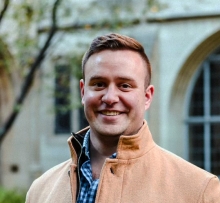This month we are featuring John Sheridan, a fourth year PhD student, who is currently working on completing his dissertation. This past spring John was awarded the prestigious Marcus Bach Fellowship by the College of Liberal Arts and Sciences, a fellowship that is awarded to graduate students in the humanities to support the completion of the dissertation. John is studying the Hutterites and feels that studying the Hutterites matter because "...it addresses identity and division in North America." Read on to learn more about John, his studies, and his goals.

Hometown
Bainbridge Island, Washington
Faculty advisor
What is your degree program and expected graduation date?
I am a PhD candidate in religious studies. I plan to graduate in spring of 2024.
Describe your research
For the last ten years, I have conducted ethnographic field research to understand Hutterites on their own terms and to get a glimpse of their socioreligious world. The quotidian instances and lived experiences that I observed in colonies spanning three Canadian provinces and five U.S. states revealed that Hutterites are much more divided and diversified than previous scholarship has depicted. I have found nuance, complexity, and diversity in Hutterite identity formations. Through my research on Hutterites, I have found potent representations of the various issues that have worked to form rural and urban identities and divisions in the U.S. and Canada. Hutterites are rural blue-collar conservative Christians and a microcosm of rural Christianities in North America. Understanding Hutterite values and identities is essential to understanding and unpacking broader rural Christianities and divisions. In my dissertation, I accomplish this by examining ways that Hutterites in colonies across the U.S. and Canada “dress” and are “dressed” by their social, emotional, and material world. I use the term “dress” as a synecdoche for all the embodied, emotional, and material practices in which Hutterites engage and engender in their daily lives.
In simple terms, why does this research matter?
In very simple terms, my work matters because it addresses identity and division in North America. The U.S. and Canada seem more politically divided than ever. This is something that must be examined and addressed if democracy is to continue. My research takes a unique approach to understanding these divisions by examining the perspectives of rural farmers and blue-collar conservatives who also happen to be Hutterites.
Dress, broadly conceived, is how I examine the values and practices that matter to Hutterites and inform their identities. Dress is a material manifestation of beliefs, praxis, embodiment, and agency, not just “material” but a way to understand Hutterites. Therefore, the upshot of this in-depth ethnography that pays special attention to the ways Hutterites understand themselves and their world will be an understanding of the emotional associations and material practices that matter to conservative rural blue-collar Christians and an explanation of socioreligious processes that construct and maintain rural-urban divides.
How soon after starting at the University of Iowa were you able to participate in research?
I am incredibly fortunate to have Dr. Nabhan-Warren as my advisor. Due to her guidance and support, I was able to receive IRB approval for my research project and begin field research my first summer in the religious studies program. That summer I visited Hutterite colonies in Saskatchewan, Alberta, and Montana, and brought home some spectacular research data.
Of course, my summer field research would not have been possible without the funding that I received from the Department of Religious Studies. In fact, the Department of Religious Studies has provided me with research funding every summer since. I feel very lucky to be part of a department with wonderful faculty who value graduate students and support the research of beginning scholars.
What are your career goals and/or plans after graduation?
I am passionate about both teaching and research. My ethnographic research has made me a better teacher and my teaching has made me a better ethnographer. Hence, I intend to find a professorship at a liberal arts university that will continue to allow me to hone my skills as a teacher-scholar.
The Department of Religious Studies is very proud of you, John, and we know you will do great things!